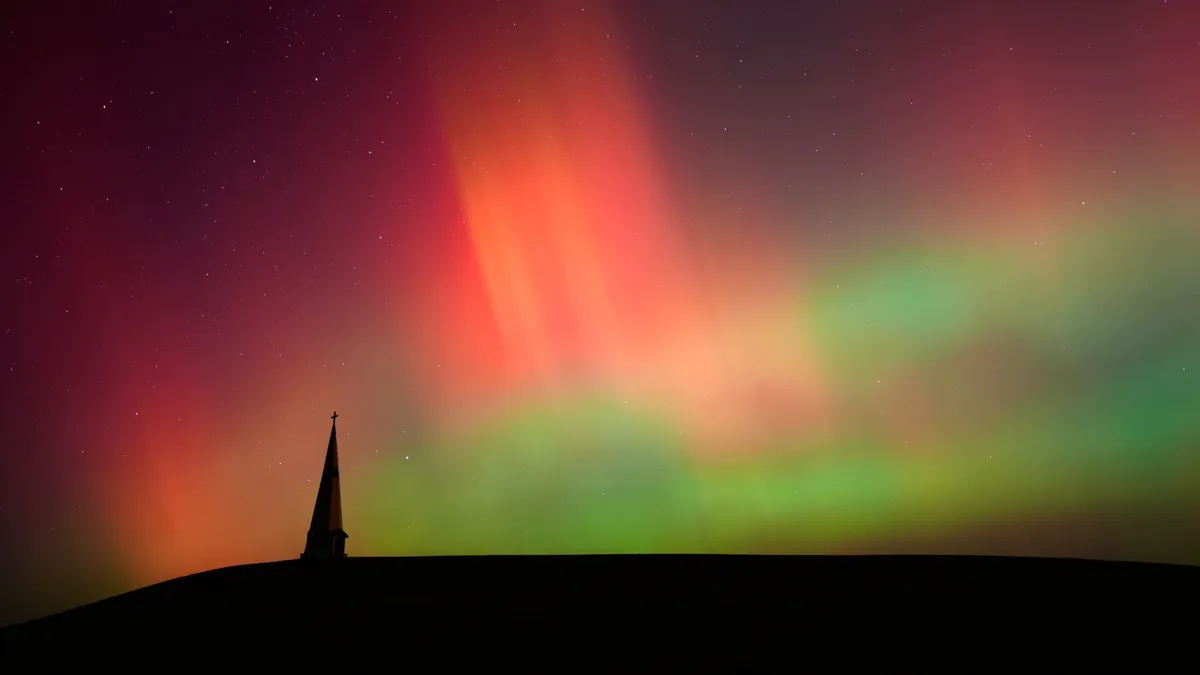
NEW YORK — On Tuesday, space weather forecasters issued a significant alert regarding incoming severe solar storms that are expected to produce stunning northern lights and potentially disrupt communication systems. In recent days, the sun has emitted several powerful bursts of energy known as coronal mass ejections, which are projected to reach Earth by Tuesday night and early Wednesday.
The anticipated severe geomagnetic storms could lead to disruptions in radio and GPS communications, according to experts from the National Oceanic and Atmospheric Administration (NOAA). The brightness and visibility of the auroras will depend on the timing of the solar bursts' arrival and their interaction with Earth's atmosphere. These vibrant displays may be visible across much of the northern U.S. and could stretch as far south as Alabama and Northern California.
The sun is currently in the maximum phase of its 11-year activity cycle, resulting in a higher frequency of northern lights displays. These colorful phenomena have been spotted in areas where they are rarely seen, and space weather experts indicate that more auroras are on the horizon. Known as the northern and southern lights, these auroras are typically visible near the poles, where charged particles from the sun interact with Earth's atmosphere.
Skygazers are experiencing the magic of auroras much deeper into the United States and Europe due to the sun undergoing a significant transformation. Every 11 years, the sun's poles swap places, creating magnetic twists that enhance the visibility of northern lights. Last year, the strongest geomagnetic storm in two decades illuminated the skies of the Northern Hemisphere, producing dazzling light displays in unexpected locations such as Germany, the United Kingdom, New England, and New York City.
The sun's current active phase is expected to continue at least through the end of this year. However, the exact timing of the peak solar activity will not be confirmed until months after it occurs, according to both NASA and NOAA.
Solar storms do more than create beautiful light displays; they can also have significant effects on Earth. When fast-moving particles and plasma collide with Earth's magnetic field, they can temporarily disrupt the power grid. Additionally, space weather can interfere with air traffic control communications and satellites in orbit. Severe storms have the potential to scramble radio and GPS communications.
Historically, severe solar storms have caused remarkable events, such as the 1859 solar storm that triggered auroras visible as far south as Hawaii and even set telegraph lines ablaze. A solar storm in 1972 is believed to have detonated magnetic sea mines off the coast of Vietnam.
Space weather experts cannot predict solar storms months in advance; instead, they provide alerts to relevant parties in the days leading up to a solar outburst. This timely information allows for necessary preparations to be made.
If you're eager to witness the mesmerizing auroras, forecasts for northern lights can be found on the NOAA's Space Weather Prediction Center website or through various aurora forecasting apps. For the best viewing experience, consider finding a quiet, dark location away from the bright lights of the city. Local or national parks are excellent spots for aurora-watching. Additionally, be sure to check the weather forecast, as cloudy conditions can obscure the spectacle entirely.
Interestingly, capturing the auroras may also be possible with a smartphone camera, which could reveal aspects of the aurora that are not visible to the naked eye.